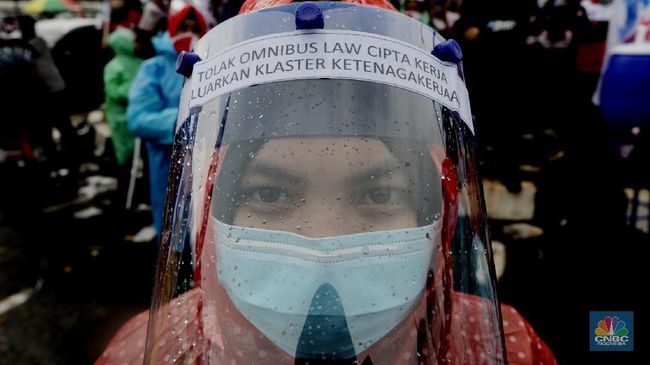Jakarta, CNCB Indonesia – The discussion on the labor cluster in the Work Creation Omnibus Law (Ciptaker) Bill began to be discussed by the government and the Legislative Body of the House of Representatives (Baleg DPR).
Of the 9 factions in the DPR, 5 factions have expressed their stance to agree to withdraw the labor cluster from being included in the Job Creation Bill. Unfortunately, the government insists on continuing to discuss the workforce cluster in the Work Creation Omnibus Law Bill.
“Until now, the government is still asking to be discussed and there are no directions to be withdrawn,” explained the Coordinating Ministry for Economic Affairs, Expert Staff for Regulation, Law Enforcement and Resilience, Elen Setiadi, Friday (9/25/2020).
The discussion on the Employment Cluster Ciptaker Bill was first discussed, Friday (25/9/2020), and the meeting went quite tough. The meeting starts at 19.23 until 22.00 WIB.
The meeting began with the submission of the background why the employment cluster should be included in the Omnibus Law Ciptaker Bill by the government.
The Secretary General of the Minister of Manpower (Kemnaker) Anwar Sanusi explained that matters relating to workers or laborers, job seekers, and those affected by layoffs are claimed to be the main problems that the government is concerned with.
“Of the 3 objects, job seekers, laborers and those who have been laid off get labor protection. And we can assure you that investment will continue to grow and develop with the draft revised Bill on Law 13/2003. [tentang Ketenagakerjaan] which is included in the Employment Cluster Ciptaker Bill Omnibus Law, “explained Anwar, Friday (26/9/2020) night.
The discussion then continued with a detailed discussion by the government regarding the 10 substances to be discussed in the employment cluster.
The 10 substances in the workforce cluster include general shares or which contain the law to be revised, the use of foreign workers (TKA), a certain time work agreement (PKWT), outsourcing, work time and rest time. .
Then other substances, namely about wages, termination of employment (PHK) and compensation for layoffs, sanctions, job loss guarantees, and other rewards.
Unfortunately, the government did not explain in detail why the 10 substances that should be included in the working copyright cluster had to be addressed. Besides that, the percentages presented by the government with those obtained by other meeting members were different. This then received many interruptions from several members of the Baleg who attended the meeting.
“It’s been postponed for a few days. But it’s not all clear. What about the Secretary General? We’re not united in this way. How about the others. What we have is different,” said a member of Baleg.
However, the meeting then continued which was then immediately discussed about PKWT which was explained by the Director General of Labor Inspection and Occupational Safety and Health of the Ministry of Manpower, Haiyani Rumondang.
By looking at the percentage, the rain of interruptions was delivered by several members of the baleg, because the government did not explain the background why PKWT had to be fixed.
“The sense of urgency of PKWT needs to be explained first. The fall of PKWT needs to be like that, there is a change in the industry model, for example. If we know our background it will be easy, if we go straight into the details, we don’t know why the response will then be changed,” said Andreas. Baleg members from the PDIP faction.
Following an interruption from the Deputy Chairman of Baleg Willy Aditya, “I do not see the problem policy where. Tetiba was born. 10. We have to imagine what the problem is, we want to go there, projections, where is the problem policy. We want to revise Law 13 / 2003, the crucial point here is to reach that point we are facing problems like this, so that PKWT and TKA must be like this. That’s how it should be, “he said.
Haiyani from the Ministry of Manpower then explained in broad outline, he said that the Job Creation Bill regarding the workforce cluster proposed by his party was believed to add protection for workers.
Not only that, said Haiyani, workers’ comfort, including the purpose of the presence of investment, which prioritizes worker protection.
“In the improvements we propose, we certainly listen to various requests from our stakeholders, especially workers. In the preparation we will be involved in the preparation of the implementation,” Haiyani explained.
– .


